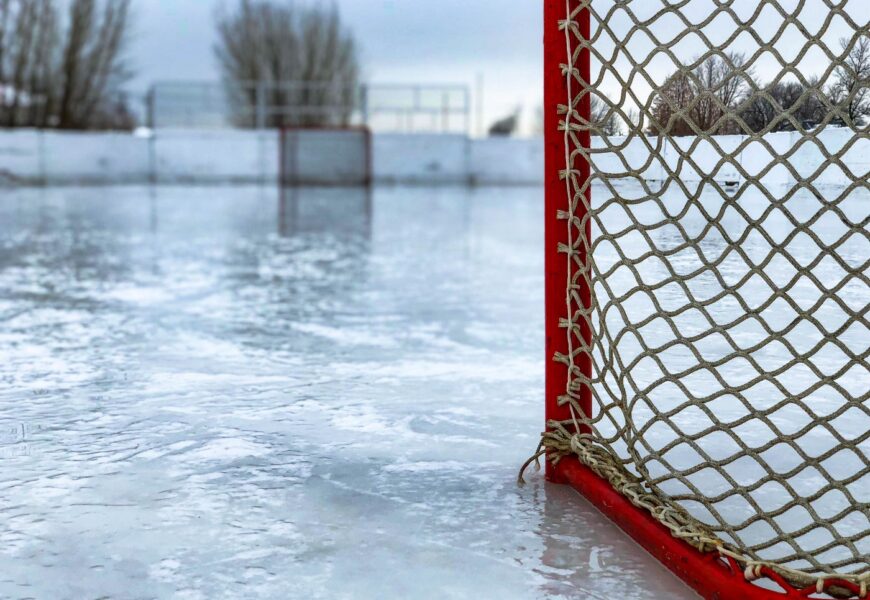When the COVID-19 outbreak hit the United States, it, abruptly ended, among many other things, my daughter’s hockey season.
For any hockey parents out there, even you crazy ones, you know well that youth hockey isn’t meant to end suddenly. There’s playoffs, there’s evaluations for next season, there’s end-of-the-season parties, and other avenues of closure after a six-plus month journey with each other. We didn’t get that this year. The players lost out on certain experiences. The parents lost out on the chance to wrap up a season with new (and, former, for some) friends.
But, that doesn’t mean many experiences weren’t had, lessons learned, or memories imprinted. And, from this dad’s vantage point, those experiences, lessons, and memories — however challenging or rewarding — will have a lasting impact on my daughter because she was the only girl on her team.
Let me give you some context:
Since her first year at the Mite level, my daughter has played co-ed hockey. However, the term “co-ed” is a bit misleading. On most co-ed hockey teams, the roster is heavily weighted with boys. Last year, she was one of four girls on the team and that was by far the most she’s ever played with. Other years, there were two or three girls. This past season was the first time she was the lone girl.
Somewhere between the ages of 8 and 14, most female hockey players stop playing in co-ed and predominantly boys programs and make the switch to all-girl programs. Heading into this season, our daughter was beginning to think about where she really belonged. Should she make the switch or stick to the male-dominated program she had known?
Her choice was to play for two teams — an all-girls travel team and the “A” team for the co-ed program, both at the 10U (Squirt) level. She did this in order to extend her time with the boys for a minimum of one more year while ensuring she didn’t miss anything on the girls side of things. She was unsure what route she wanted to go and we supported her.
Our weekend’s were completely insane. Our weeknights just as crazy. To say that a home-based isolation period was what our family truly needed after the season would be an understatement.
But, that’s not the point of this essay. The point of writing this is to share with other dads whose daughters may be in a similar space — whether it’s with hockey, soccer, baseball, football, or some non-sport activity — what we uncovered through what was undoubtedly a coming-of-age season for our girl, along with what it all means moving forward. My hope is that the experiences — the good and the bad — can help you decide what route is best for your daughter when it comes to sports and other activities with boys.
With all that said, here are the eight important life lessons she learned playing as the only girl on her hockey team:
Setting challenging goals can be healthy
Towards the end of the previous season, she unexpectedly set a personal goal of making the “A” team. When, towards the end of last year, it seemed like she was going to choose to play exclusively for an all-girls program, she told us she’d want to play for both teams if she made “A” for the co-ed program.
Like all good hockey parents, we said, “OK,” knowing damn well what that commitment level meant.
She worked her butt off practicing to get better. She performed well during evaluations and she achieved her goal.
She was so proud of herself, rightfully, for making the team. We were so proud of her for setting a goal and achieving it. We even got her a cake.
Throughout the process, she seemed to learn that nothing is guaranteed. She knew there was a strong chance she wouldn’t make the team. It didn’t seem to bother her when committing to the goal.
She also learned what it was like to make commitments to two teams. Kudos to her for never putting up much of a fuss — aside from the mornings she had a 7 a.m. game and wakeup was much earlier than that. And, when she did, we reminded her that she committed to both teams and they were both relying on her. She always took these commitments seriously, and I’m grateful for that.
I hope that her experience setting a challenging goal and achieving it, and sticking to challenging commitments is something that feeds future decision-making and life choices.
Good coaches are everything
I can’t say enough about her coaches this season and through discussions, she feels the exact same way.
The head coach of her girls team, a good friend, was simply meant to be a girls hockey coach. His demeanor with the girls was everything. He challenged them but was emotionally aware. It’s my opinion that every girls coach should be that way.
I was equally impressed with how the coach of the boys team found a way to ensure she was “just another player,” while making sure the boys were acting like gentlemen. He expected from her exactly what he was expecting from her teammates — and that resonated well with her.
As parents, we also appreciated it. We knew she had her own feelings of “being different,” and to have the coach (and his assistants) never add to that pressure absolutely heightened the experience. It also gave her the room to grow as a player.
Boys can be weird sometimes
And, by weird, I mean they can say that they “like” you. Like like like you.
Fortunately, for both her and this dad who’s nowhere near ready for boys to be in the picture like that, there was only one time where things got awkward. It was, however, a turning point of sorts for my hockey star.
Once it was revealed that one of her teammates “liked her,” my daughter seemed to not know how to feel around him. She said she didn’t feel the same way back, and referred to him as a nerd, which I appreciated. But, once it was out, it was out. It couldn’t be unsaid, and that — however innocent, genuine, or unthreatening — made her feel weird.
As if she needed another reason to feel different among her teammates …
Boys can have your back
She also learned that, even though boys can definitely be weird sometimes, they will have your back when shit goes down.
There was a game in January where she was given a cheap-shot elbow to the head and pressed into the boards by a bigger kid before going down to the ice. Before the officials could even blow the whistle to stop play, one of her teammates and a longtime friend (the smallest player on the ice, mind you) was in the assailant’s face, pushing and shoving him for going after her. Another teammate sprinted from center ice to avenge his teammate while another was down on the ice with her on one knee making sure she was ok.
Now, it should be made clear that I don’t condone violence of any sort on the ice. But, anyone that knows hockey knows events like this are just part of the game.
Fortunately, she was OK — just shaken up a bit. Also on the bright side was the fact that this was a turning point for her.
Up until this game, and this moment, she felt like a bit of an outsider on the team. I mean, she was the only girl. There were also other times when she was innocently left to partner with the coach rather than with a teammate when doing dryland or other partnered drills. Even more, she just seemed to not have too much in common with the boys.
None of that mattered, though, when she was just another teammate they were supporting after she was injured. This seemed to be exactly what she needed to experience as she went on to play with much more confidence and ease as the season progressed.
For any fathers of sons — or coaches — with a girl on the team, I’m confident they just want to be seen as a member of the team. Nothing more, nothing less.
Hey, I’m pretty good at this
Playing with the boys team challenged my daughter. The game was incredibly fast and many of the players on her team and those that she faced had hockey skills beyond what she had ever experienced before the season.
But, you know what? She handled it all very well and became a vital defender for the team. She was consistent and played her position well, which led to a terrific plus-minus along with her defensive line mate.
She also learned to be physical playing with the boys.
The time I told you about earlier where the boy cheap-shotted her? Yeah, she pretty much deserved it because of the physical way she controlled the space in front of her team’s net. She — all 58 pounds of her — really seemed to take to being her team’s goon in front of the net. She was an absolute pest boxing out, lifting sticks, and pushing not so politely.
She felt it was her job to make it so her goalie had a clear view of the ice and no one was in a position to shoot should the puck end up in front of the net. Her commitment helped her team to a successful season and helped her feel more at ease amongst the boys thanks to the pats on the helmet and fist-bumps she’d get from players and coaches upon returning to the bench after a quality shift.
All things considered, I think she ended the season a much improved player with added confidence on the ice. She tried out for two all-girls travel programs and was invited to play for the top tier team for both. She seemed to be playing at a different speed than some of the other athletes thanks to her experiences with the boys team.
It really sucks to fail
Hey, they can’t all be victories, right?
She feels like she failed this season because she was the only player on her co-ed team to not score a goal.
She listens to when we tell her that, as a defender, she doesn’t need to score goals to help her team win. She nods her head when we remind her that it’s mostly her job to get the puck to the forwards so they can maximize offensive opportunities. She smiles when we remind her of all the assists she had during the season. She smiles when we remind her she led her girls team in goals.
But none of that really matters to her. She really wanted to score a goal for the boys team this season.
She also experienced failure during a tournament game in Lake Placid when a puck she deflected went by her own goalie. She. Was. Devastated.
I think it’s important for our children to fail. It gives them perspective they otherwise wouldn’t have the opportunity to gain.
Girls have to prove themselves more
This one is more from my vantage point as a parent than her point of view, but I think she felt it, too.
Early on in the season, I could sense a bit of “concern,” from the other players’ parents when she would get the puck. In a way that wasn’t directly criticizing her play, there would be a collective holding of breath until she made the right play.
There weren’t any life-changing events in this regard, but if I’m being honest, I did it, too. I thought she needed to play perfectly, better, faster in order to “keep up.” This was a terrible attitude to take and when I let off that idea, I saw that she was doing so in her own fashion.
These could all be said for any unproven player — regardless of gender. But, whether it was due to personal, external, or parental forces, it seemed like she knew she needed to work harder, execute perfectly in order to prove herself.
I like that she held herself to a higher standard, but it’s important for her to know that the higher standard should be set by her and no one else.
It’s time to play only with girls — because I want to be myself
All of the experiences resulted in a feeling that she wanted next year to play exclusively with girls.
Fortunately for her, our area is seeing a boom in girls hockey growth and she had the opportunity to pick from three great programs in the region. Fortunately for us, she picked the one that practices and plays its home games at the rink closest to us!
I can’t understate the importance of the challenges she faced and lessons she learned throughout the season with boys. As her Dad, I have some regrets with how I responded to certain challenges and remain committed to learning from these experiences, too.
It’s also important to state that the coaches and players from her boys team were nothing but kind, supportive, and thoughtful throughout the season. There’s just a different comfort level she has when she’s with her girl teammates.
She’s a different person — herself — in the girls locker room. She’s more excited when going to girls practices and games. She stands out more on the ice with the girls team. She shines a bit brighter.
So, she’s making the switch. She’s taking the lessons learned — from playing with both teams — and making the decision to play exclusively with girls moving forward. According to many high-level coaches, she’s making the right decision for many reasons, including emotional, physical, and mental factors.
As her Dad, I think she’s making the right decision because she’s more at ease with the girls. She feels she has more room to be her goofy, sometimes defiant, always hilarious, smart, strong, and kind self.
And, for that, I’m grateful.
So, what does this mean for dads whose daughters are facing similar circumstances?
As you read, she had a few lows, many highs, and countless experiences that undoubtedly imprinted in her psyche.
The yin and yang felt by the two vastly different experiences seemed to fast-forward her experiences both as it relates to hockey and life. But, I want to tell you about one that really opened our eyes.
Between the two teams — all 80+ games and who knows how many practices — that gap in experiences was never as evident than before a state tournament game with her boys team.
All was well until she had some sort of an anxiety attack minutes before they were to hit the ice. Despite me typically being with her in the locker room when playing with this team (my wife takes locker room mom duties for the girls team), my wife was with her when coach said, “let’s go, we’re going on the ice in a few minutes.” Realizing she wasn’t quite ready, she became emotional, began breathing heavy, and was incredibly overwhelmed as she finished getting her equipment on.
Mom somehow got her back from the brink and into a state to go out and play, but as a family, we were shook.
I told my wife how she’d shown similar feelings of overwhelm throughout the season in that locker room, and, like an idiot, I’d just chocked them up to pre-teen, “shutup Dad,” emotions. Boy, was I wrong.
As that game went on and (knowing her, until now) my wife, covered in guilt, wondered what we unknowingly subjected our baby girl to since September.
In speaking with a counselor, we believe she felt the anxiety and overwhelm because she didn’t want anyone in that locker room to see that she was “behind.” She didn’t want her male teammates to see her in a certain light — weaker, slower, not as good as them.
Now, that was not the norm. However, just knowing she felt that way even once breaks my heart as her dad. Wasn’t I supposed to shelter her from that? At the least, I should’ve recognized the experience.
What I’ve come to realize is that her experience playing as the only girl on the team was a necessary one. Because, for any “negative” experiences, there were countless others that left and will continue to leave a positive impact on her life. It’s the balance of the two — the good with the bad, so to speak — that makes it so tough. As a parent, isn’t it your main job is to prepare your child for whatever life throws at them? For that, I’m grateful she experienced these challenges, but damn the part of me who just wants to protect her is reeling from the things she endured this past season.
I just wish we were able to spot her anxiety earlier and deal with it more appropriately.
As a growth-driven dad, I look forward to taking my own experience with totally botching that response and ensuring my antennas are up as she continues on — both on and off the ice. And, I hope by sharing these experiences — the good, bad, and indifferent — you’re able to navigate your child through similarly challenging, yet rewarding, situations.







